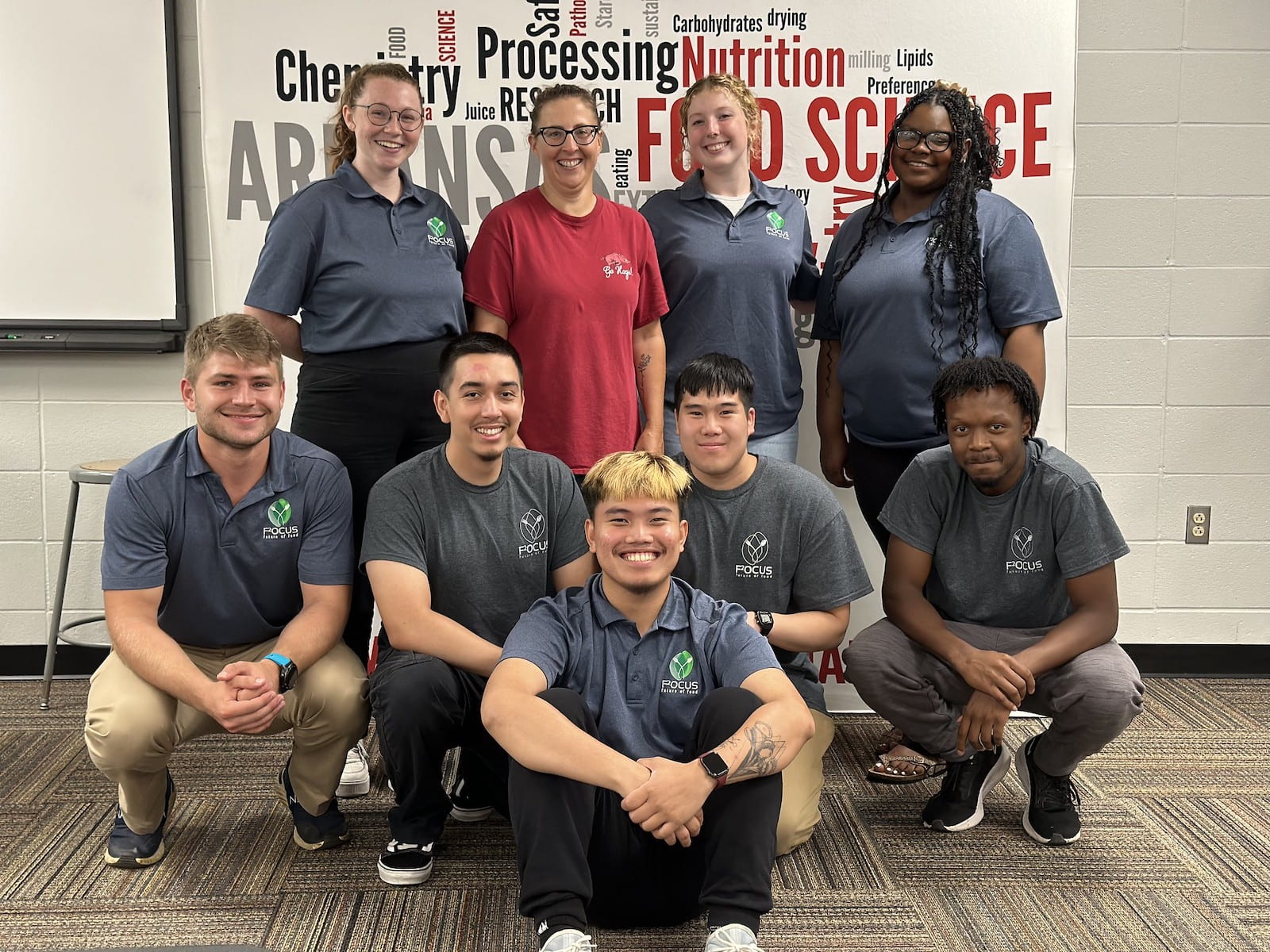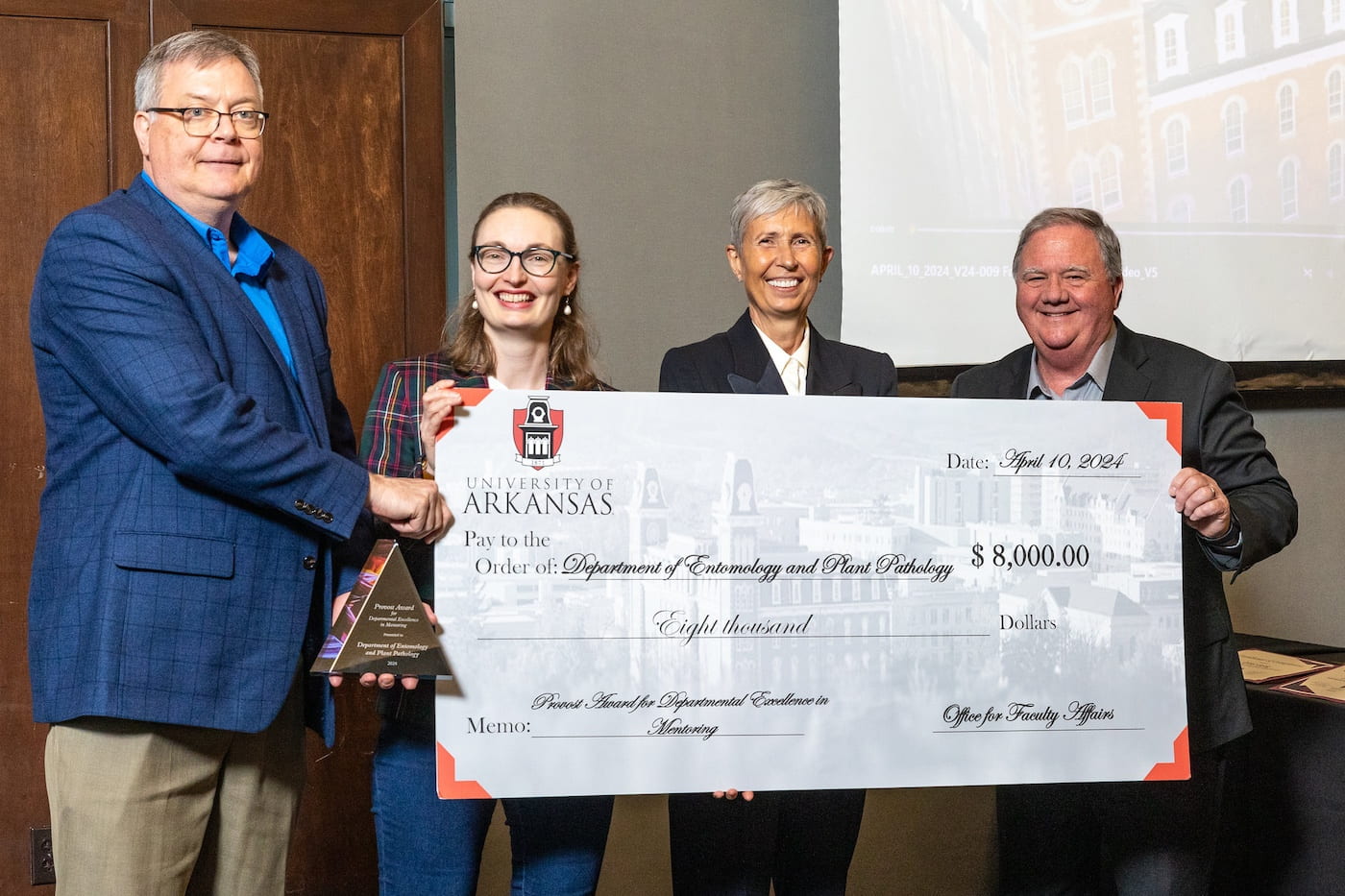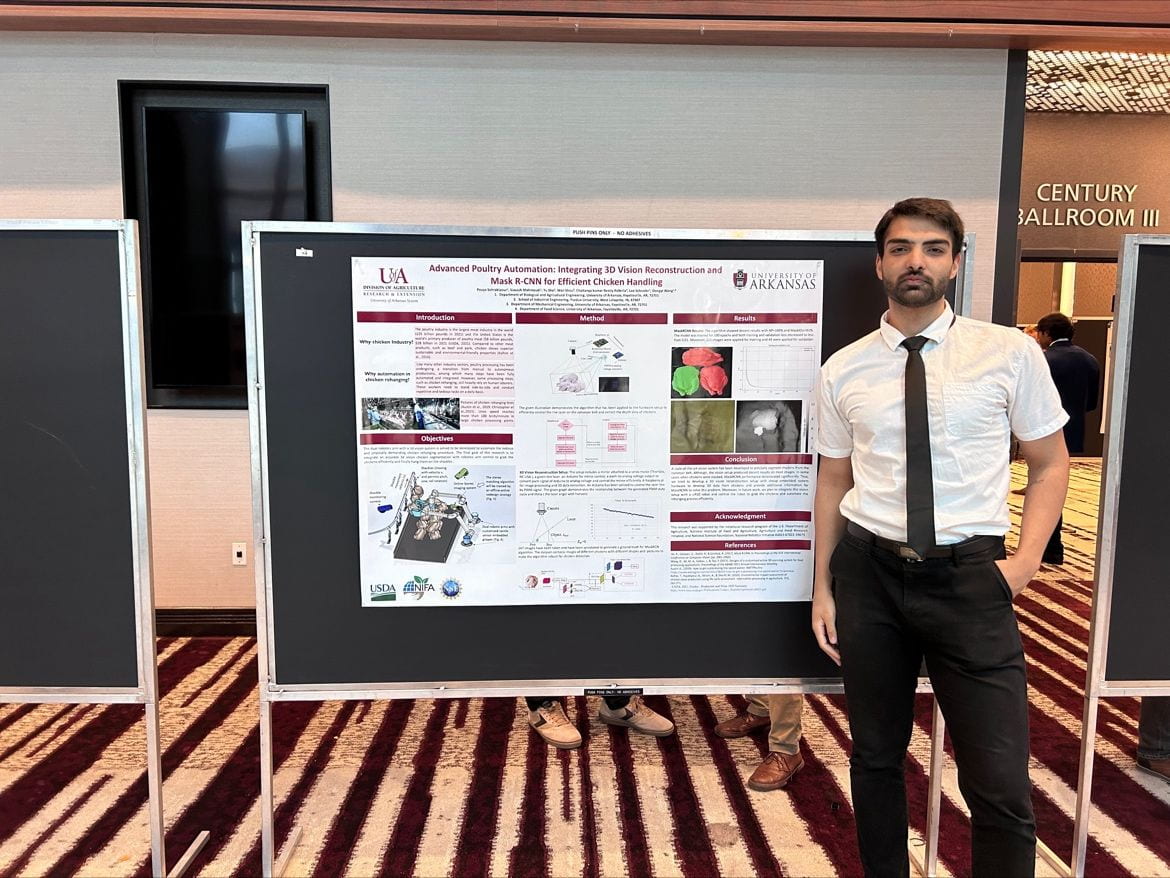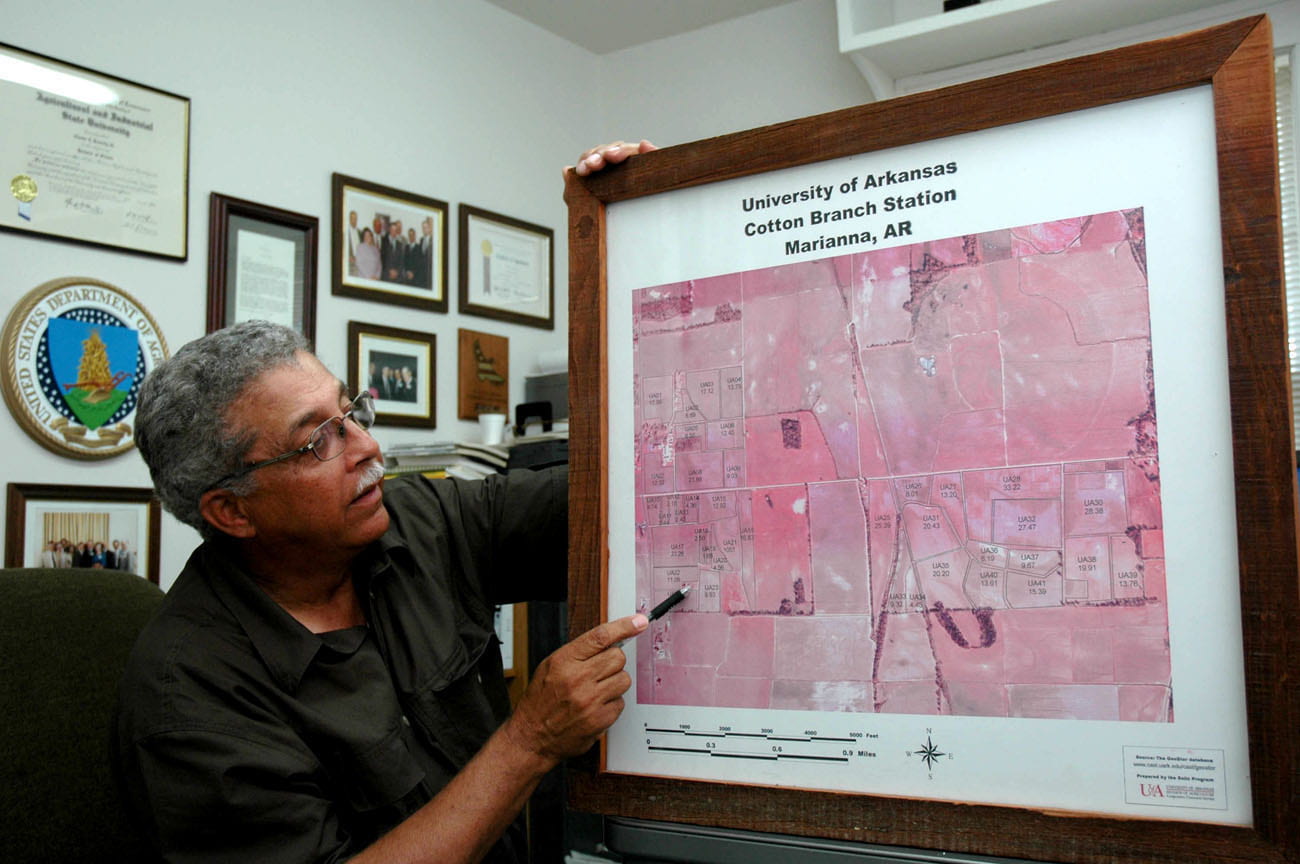Future of Food Fellowship Opens Students’ Eyes to Possibilities in Food Industry
Eight undergraduate students participated in 2023 F2OCUS Fellowship Program
By John Lovett – Aug. 11, 2023

FOOD FOCUS — The 2023 F2OCUS class included eight students, seen with Andrea Myers, food science program technician and product development leader. Pictured are Alyssa Finocchiaro, back left; Myers; Gracie Howard; Kennedy Christmas; Nicholas Stall, front left; Alex Rosales; Alex Lee; Aidan Douglas; and Keith Andzrej Monsalud, front-center. (U of A System Division of Agriculture photo)
FAYETTEVILLE, Ark. — A University of Arkansas System Division of Agriculture program is opening more eyes to the possibilities of careers in food science.
The Future of Food: Opportunities and Careers for Undergraduate Students — F2OCUS Fellowship Program — recently completed its second session to increase understanding of food supply safety, quality and security for undergraduates in complementary degree programs like biology, chemistry and agricultural studies.
“The neat thing about this program is how well it gives the students such a huge view of what the food industry has to offer from a career standpoint,” said program co-director Jennifer Acuff, assistant professor of food microbiology and safety for the Arkansas Agricultural Experiment Station. “The whole goal is to show them there are just a million opportunities out there and any interest you have can be paired with the food industry somehow.”
The experiment station is the research arm of the University of Arkansas System Division of Agriculture.
F2OCUS is directed by Kristen Gibson, professor of food safety and microbiology and director of the Center for Food Safety for the experiment station. Each session lasts 10 weeks, and the program is funded by a five-year, $730,000 grant from the U.S. Department of Agriculture’s National Institute of Food and Agriculture.
Other co-directors include Jamie Baum, associate professor of nutrition for the experiment station, and Jill Rucker, associate professor of agricultural education, communications and technology for the Dale Bumpers College of Agricultural, Food and Life Sciences at the University of Arkansas. Room and board are provided to F2OCUS fellows, along with a $5,000 stipend and travel support.
F2OCUS 2023
Eight students were chosen to take part in scientific research with Division of Agriculture faculty and develop team building and leadership skills. They also received communications coaching from the Washington County Office with the Cooperative Extension Service. The extension service is the outreach arm of the Division of Agriculture.
The 2023 F2OCUS fellows were:
- Kennedy Christmas, biology student at Baton Rouge Community College.
- Aidan Douglas, nutrition student at Louisiana State University.
- Alyssa Finocchiaro, cell and molecular biology student at the University of South Florida.
- Gracie Howard, health education and promotion student at the University of Arkansas at Little Rock.
- Alex Lee, biological sciences student at the University of Arkansas at Little Rock.
- Keith Andzrej Monsalud, biological sciences student at Arkansas State University.
- Alex Rosales, chemical engineering student at the University of California, Berkley.
- Nicholas Stall, food science/technology student at Louisiana State University.
“We had a more diverse cohort this year that represents what the program is trying to do,” Gibson said. “We were also able to expand our industry visits, to be more diverse in the food industry we have in Fayetteville and the region.”
Gibson said new industry site visits for this year’s fellows included those with Newly Weds Foods and Conagra Brands. They also visited Simmons Foods and Tyson Foods for educational programs.
“The industry visits are where we get to show how their research is applied and they get to see how multi-disciplinary every job in the food industry is,” Acuff said.
F2OCUS fellow experiences included the ExCEL course at the Arkansas 4-H Center in Little Rock, which features a high-ropes course and zipline, as well as visits to the Tyson Discovery Center and the annual Blackberry Field Day at the experiment station’s Fruit Research Station near Clarksville.
In addition to the four project directors, the program features 12 collaborating mentors with extensive mentoring experience chosen to assist with the fellowship program. Industry professionals, many of whom are University of Arkansas graduates and serve as adjunct faculty, also participated in the fellowship program.
Gibson matches students with a research mentor based on their interests, such as food chemistry, food engineering, and food safety. For example, Acuff and Tomi Obe, assistant professor of poultry science with a focus on poultry processing and food microbiology, served as mentors to those who expressed interest in food safety.
“Their research is very much geared toward what they have indicated they are interested in, but by doing the industry visits and the product development, they get exposed to all of it,” Gibson said. “They get some level of exposure to the different disciplines that make up food science as a whole.”
Product development
As part of the program, the students must work as a team to develop a baked food product meeting specific nutrition and ingredient criteria.
Andrea Myers, program technician in the food science department, led the eight students in a product development competition with two teams. One team developed the “Bagel Buddy,” a package of four bagel balls with a blueberry-lemon cream cheese dipping sauce. The second team had “smart tarts” they called “Starts,” which were an Asian-inspired quiche-type tart, Myers explained.
The students had up to seven visits to the kitchen to develop and adjust their products. At the end of the competition, they presented their products to three judges in the product development industry. Myers said after judging, there was just a four-point difference between the two teams.
Ali Ubeyitogullari, assistant professor of food engineering, also worked with Rosales to blend a slurry of carrots and other vegetables to print a 3D food product. They presented a poster about the research at the end of the fellowship session.
Opening minds
Gibson said the program aims to engage students who do not come from institutions with food science programs and are not native to Arkansas.
“It makes a big difference when you have everyone coming in from somewhere else and living together,” Gibson said. “They were able to build a cohort together, and you could see they genuinely enjoyed being around each other.”
Gibson said one of the F2OCUS fellows plans to transfer to the food science program, and another fellow is compelled to seek employment in the food industry because they “realized they have a skillset that would be useful,” Gibson said.
Several of the students realized how their interests in engineering, nutrition and biology could lead to a career in food science, Acuff noted.
“We had a really good group, a diverse group, coming from all different perspectives,” Gibson said.
The F2OCUS program is supported by USDA-NIFA grant number 2022-68018-36612.
To learn more about Division of Agriculture research, visit the Arkansas Agricultural Experiment Station website: https://aaes.uada.edu. Follow us on 𝕏 at @ArkAgResearch and Instagram at @ArkAgResearch.
To learn about Extension Programs in Arkansas, contact your local Cooperative Extension Service agent or visit https://uaex.uada.edu/. Follow us on 𝕏 at @AR_Extension.
To learn more about the Division of Agriculture, visit https://uada.edu/. Follow us on 𝕏 at @AgInArk.
About the Division of Agriculture
The University of Arkansas System Division of Agriculture’s mission is to strengthen agriculture, communities, and families by connecting trusted research to the adoption of best practices. Through the Agricultural Experiment Station and the Cooperative Extension Service, the Division of Agriculture conducts research and extension work within the nation’s historic land grant education system.
The Division of Agriculture is one of 20 entities within the University of Arkansas System. It has offices in all 75 counties in Arkansas and faculty on five system campuses.
The University of Arkansas System Division of Agriculture offers all its Extension and Research programs and services without regard to race, color, sex, gender identity, sexual orientation, national origin, religion, age, disability, marital or veteran status, genetic information, or any other legally protected status, and is an Affirmative Action/Equal Opportunity Employer.




